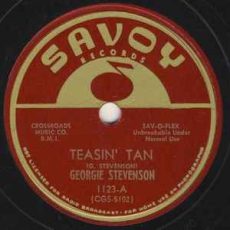
Daily Dose Of Jazz…
George Stevenson was born into a musical family on June 20, 1906 in Baltimore, Maryland. His brother Cyrus and his father both played piano. At 15 he studied saxophone and trombone with A. J. Thomas eventually joined his Baltimore Concert Band. His trombone style was greatly influenced by Tricky Sam Nanton.
By 19 he joined pianist Harold Stepteau and his Melody Boys, before organizing his own 11-piece Baltimore Melody Boys. They disbanded in 1928 and he moved to New York City. He would go on to play with Sammy Price and His Texas Blusicians and Hot Lips Page and His Band. Through the 1930s and 1940s he worked with various other bands including the Savoy Bearcats, Charlie Johnson, Fletcher Henderson, Claude Hopkins, Jack Carter’s Orchestra, Lucky Millinder, Cootie Williams and Roy Eldridge, and Cat Anderson.
From 1948 he went on to freelance with several leaders, continuing to perform through the 1960s. He briefly led his own band in 1959 and his last performances were with Max Kaminsky a year before his death.
Trombonist George Stevenson died on September 21, 1970.More Posts: bandleader,history,instrumental,jazz,music,trombone
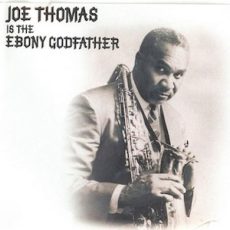
Daily Dose Of Jazz…
Joseph Vankert Thomas was born on June 19, 1909 in Uniontown, Pennsylvania. His first band job was with the Earl Hood Orchestra and after eight months Horace Henderson offered him a job. Heplayed alto saxophone under Hood and Henderson, but took up the tenor saxophone when he joined Stuff Smith’s band in 1932.
He played with Jimmie Lunceford’s band from 1933 until the leader’s death in 1947, often soloing and occasionally singing. After Lunceford died, Thomas and Ed Wilcox co-led his ghost band until he left to form his own septet. This band members were trumpeter Johnny Grimes, trombonist Dicky Harris, baritone saxophonist Ben Kynard, pianist George Rhodes, bassist George Duvivier, and drummer Joe Marshall. They recorded between 1949 and 1951.
When Joe left the music industry he went to work for his family’s undertaking business. He played occasionally, accepting an invitation to the 1970 Newport Jazz Festival, and recorded again under his own name in 1979. Three years later he recorded with a septet that included Grimes, Harris, and Duvivier from his band three decades earlier.
Tenor saxophonist and vocalist Joe Thomas died on August 3, 1986 in Kansas City, Missouri. Material from his career is held by the University of Missouri, Kansas City.
More Posts: bandleader,history,instrumental,jazz,music,saxophone
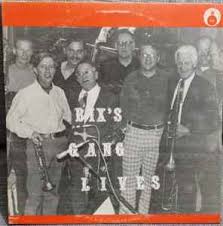
Daily Dose Of Jazz…
William C. Rank was born in Lafayette, Indiana, on June 8, 1904 and initially worked in Indiana and Florida. In 1922, He played trombone in Tade’s Singing Orchestra, which was led by violinist Tade Dolen. Between 1923 and 1927 he played with Jean Goldkette’s band in Detroit, Michigan and often recorded with Bix Beiderbecke.
After playing with Adrian Rollini in 1927 he had a period working freelance, then he joined Paul Whiteman’s band, and stayed until 1938. Rank became a studio musician in Hollywood into the early 1940s, when he moved to Cincinnati, Ohio It was while living here that he led a tenet for the rest of the 1940s.
After changing his musical lifestyle to performing part-time, he worked in the insurance industry. His one album as a leader, a tribute to Beiderbecke, was recorded in 1973.
Trombonist Bill Rank continued playing until a short time before his death, on May 20, 1979, in Cincinnati.
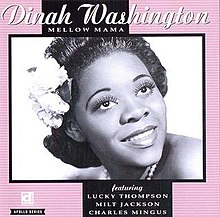
Daily Dose Of Jazz…
Eugene Porter was born in Pocahontas, Mississippi on June 7, 1910 and began on cornet, but when his instrument was stolen he picked up saxophone and clarinet, studying the latter under Omer Simeon. His family moved to Chicago while still in high school, but left school early to start a career in music
Moving to New Orleans, Louisiana in the Thirties he worked in and around town as well as on riverboats, with Papa Celestin, Joe Robichaux, and Sidney Desvigne. He was with the Jeter-Pillars Orchestra from 1935 to 1937, then played with Don Redman briefly before returning to Jeter-Pillars until 1942. Following this Gene worked with Jimmie Lunceford and then with Benny Carter until 1944, working as assistant bandleader under him. He appeared in several films, including with Fats Waller.
Porterer was in the Army in 1944-45 as a member of an Army band, then played with Carter again and recorded with Dinah Washington during this period. For the next two years he performed with Charles Mingus and Lloyd Glenn.
After moving to San Diego, California in 1948 he played with Walter Fuller until 1960. Gene led his own ensemble at the Bronze Room in La Mesa, California beginning in 1967.
Saxophonist and clarinetist Gene Porter, who was named a member of the St. Louis Jazz Hall of Fame in the 1980s, died in San Diego County, California, on February 24, 1993.
More Posts: bandleader,clarinet,history,instrumental,jazz,music,saxophone
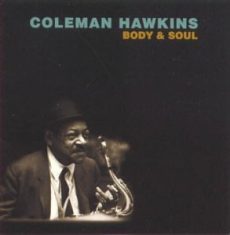
Daily Dose Of Jazz…
Arthur Herbert was born May 28, 1907 in Brooklyn, New York to Trinidadian parents. As a young man he worked in a silver and gold refinery while playing local gigs in New York nightclubs and hotels in his spare time. In 1935 he joined Eddie Williams’s band, and soon after started his own, the Rhythm Masters.
In the 1930s and 1940s he worked as a sideman with musicians such as Pete Brown, Coleman Hawkins, Hot Lips Page and Sidney Bechet. The 1950s saw Herbert in semi-retirement as a musician and started up his own pest extermination business. He played in various swing jazz revival ensembles, and toured with Lem Johnson in Poland in the 1960s.
Herbert taught his nephew, drummer Herb Lovelle, to read sheet music, something black musicians were then not held to know. He got his nephew his first gig with Hot Lips Page. He also taught drummer Shelly Manne, according to Herb Lovelle.
Drummer Arthur Herbert date of death is unknown but would have celebrate his 117th birthday today.More Posts: drums,history,instrumental,jazz,music



